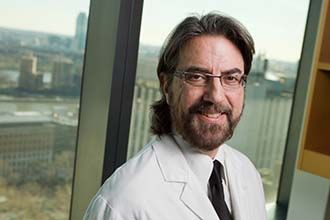
Research
My laboratory in the Sloan Kettering Institute focuses on mechanisms of normal and tumor tissue damage in collaboration with Zvi Fuks, former Chair of the Department of Radiation Oncology at Memorial Sloan-Kettering Cancer Center. Together we have proposed new concepts regarding the mechanism by which high single dose radiotherapy (SDRT, also known as stereotactic radiosurgery) induces cell killing in vivo. Early on we decided to model tumor response by studying radiation damage to the gastrointestinal (GI) tract. The reason for this decision was that the small intestines represented, at that time, the best-defined in vivo system for studying injury to the stem cell clonogen compartment. Our investigations led us to propose that SDRT exposure acts via a mechanism different than conventional fractionated radiation, engaging a rapid ceramide-driven wave of microvascular endothelial cell apoptosis that couples microvascular dysfunction to tissue stem cell demise. Based on this information, about 7 years ago my laboratory began development of anti-ceramide antibodies to protect and mitigate GI tract damage, such as might occur after a Fukushima-like accident or urban terrorism. Recent studies in collaboration with the Radiation Countermeasures Program at NIAID show that our biology translates closely from rodents to monkeys (rhesus macaques), and that our anti-ceramide single chain variable fragment is highly effective as prophylaxis or treatment in attenuating this microvascular pathology. Further, we have collaborated with Hans Clevers and Phil Paty, examining the impact of ionizing radiation on the Lgr5+ crypt base columnar cell, identified by the Clevers lab as an intestinal stem cell and have shown inhibiting ceramide-mediated vascular dysfunction initiates a previously unknown tissue reparative program that protects this critical stem cell compartment. More recently, we have shown that our anti-ceramide strategies are also effective in chronic microvascular pathologies. In this context, in collaboration with Julia Busik at Michigan State University, we have shown that anti-ceramide Abs can prevent progression of non-proliferative (early) to proliferative (late) diabetic retinopathy, a major cause of blindness in the western world.
Current Projects:
- Anti-ceramide Ab protection from a limited nuclear attack
- Ceramide-mediated chemosensitization and radiosensitization in cancer patients
- Ceramide regulation of CD8 cell-mediated cell killing
Bio
I am a Phi Beta Kappa graduate of Johns Hopkins University and obtained an MD degree at the University of Chicago. Thereafter I spent a year with the Flying Doctors in Kenya treating Trachoma, a chlamydial disease that is a leading cause of blindness in Africa. I came home to the Bronx for internship and residency at Einstein University and thereafter did Endocrinology training at NYC/Bellevue. I did extended post-doctoral lab training at Cornell University. I have spent my career at MSKCC as a PI in Pharmacology and BMCT in SKI, and as a practicing endocrinologist at Memorial Hospital.
Distinctions:
- Discovered the Sphingomyelin/Ceramide Signaling Pathway for Apoptotic Cell Death
- Co-developed the Single Dose Radiotherapy approach to cancer cure
- Development of an anti-ceramide Ab for treatment of a limited nuclear attack with the NIH and DOD
- Development of anti-ceramide Ab as treatment for diabetic retinopathy
- Founded the Ceramedix network of biotech companies
- Membership in the American Society of Clinical Investigation
